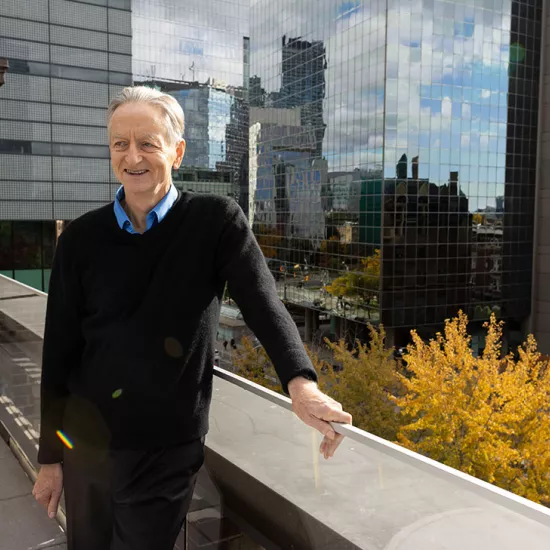‘We will not forget’: U of T community marks 4th anniversary of Flight PS752

Four years after the downing of Ukraine International Airlines Flight PS752, the shock of the tragedy has not worn off for Niloofar Ganji.
“It’s hard to believe it happened in the first place,” says Ganji, a PhD student in the University of Toronto’s Temerty Faculty of Medicine.
The Ukraine International Airlines jet was shot down by Iranian armed forces shortly after takeoff on Jan. 8, 2020, killing all 176 people aboard – many of them university students bound for Canada after the winter break. The victims included eight U of T community members: Mohammad Amin Jebelli; siblings Mohammad Asadi Lari and Zeynab Asadi Lari; Mohammad Salehe and spouse Zahra Hasani; Mohammad Mahdi Elyasi; Mojtaba Abbasnezhad; and Mohammad Amin Beiruti.
In the years since, the U of T community has honoured and remembered the eight victims in ways that are both private and public.
Two of the students – (Mohammad) Asadi Lari and Amin Jebelli – studied in the same faculty as Ganji, who is an executive member of U of T Students for a Free Iran (UTSFI). Both are remembered for having a tremendous impact on their classmates and teachers. In 2022, Asadi Lari was named valedictorian posthumously by MD/PhD graduates in Temerty’s Faculty of Medicine.
His sister Zeynab was a U of T Mississauga student with a strong admiration for medicine and global health who was an outspoken advocate for mental health. To honour her memory, UTM created the Zeynab Asadi Lari Healthy Campus Award.
“The award recognizes a student champion for holistic health – who has made a positive impact on the campus’s physical, emotional, and social life and who has fostered a sense of community rooted in equity and respect,” said Alexandra Gillespie, UTM principal and U of T vice-president, on the second anniversary of the tragedy.
“It recognizes a student leader who had made our campus – and our world – a healthier, more open, and more truthful place to live; and so it rightly carries Zeynab’s name.”
Abbasnezhad, meanwhile, studied in the Faculty of Applied Science & Engineering. Hasani was looking forward to pursuing her graduate studies at U of T. Elyasi was a mechanical engineer who studied at U of T and the University of Alberta, and helped teach English to refugees. Beiruti and Salehe both studied computer science in the Faculty of Arts & Science, with Salehe posthumously publishing a paper that won an honourable mention at an international symposium on edge computing.
Ganji is helping organize an event at U of T on Jan. 11 to honour the eight students and to demand accountability for the tragedy. Speakers include Atena Daemi, an Iranian civil rights activist, Mohsen Ahmadipour, a family member of a victim, Saeid Dehghan, a human rights lawyer, and Alexie Tcheuyap, U of T’s associate vice-president and vice-provost, international student experience.
“As Iranian students at U of T, it is our responsibility to make sure this event gets commemorated every single year,” Ganji says. “It’s a very emotional time and we are lost for words thinking about the fact that four years have gone by. The most important message we can convey is that we will not forget, and we will not forgive.”
In the memory of the victims, U of T established the Iranian Student Memorial Scholarship fund in 2020 to support international students from Iran or current students from any background taking Iranian studies. To date, the scholarship has changed the lives of several students, who have studied in fields ranging from music to computer science.
Amirali Atrli, an undergraduate studying math and physical sciences, has said the award has helped him focus on his studies.
“I’m happy that we value science so much today,” Atrli said. “When I look at papers and see Iranian scientists in various research teams, it makes me proud, and also hopeful for a future where this body of scientists isn’t scattered across the world and has the possibility to pursue what they aspire to at home.”



